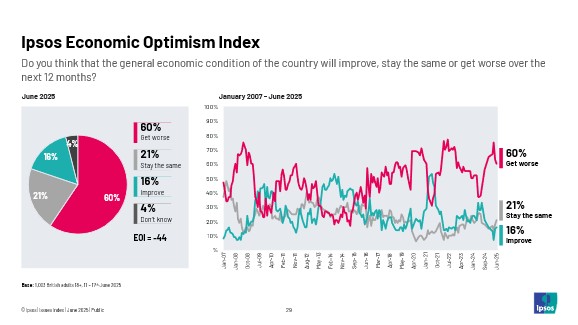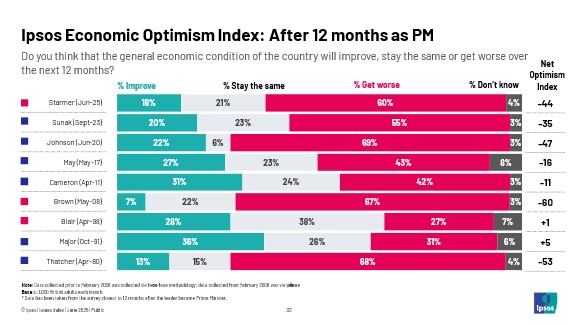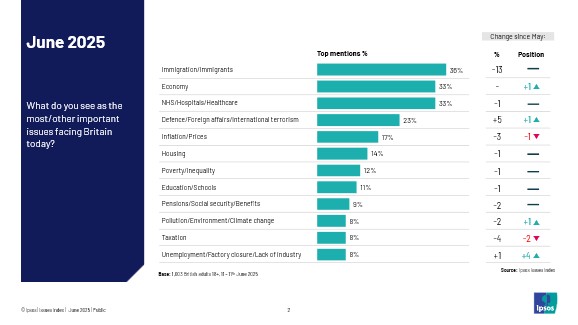One year on: Economic optimism has halved since July 2024 as 6 in 10 think economy will get worse
Ipsos’ Economic Optimism Index asks Britons whether they think the general economic condition of the country will improve, stay the same, or get worse over the next twelve months, and has been tracking the economic mood of Britons since 1978.
The latest results show 16% think the economy will improve, and 60% get worse, giving a net Ipsos Economic Optimism Index figure of -44. This is a marginal increase from last month (when it stood at -48) and shows pessimism about the economy abating since March and April. However, it is still well below the long-term 47-year average of -18, and also worse than the more recent 5-year average since 2020 of -33. In July 2024, after the general election, 33% thought the economy would improve over the year, double the proportion who say so now. 43% said the economy would get worse, giving a net figure of -10.

The level of net economic optimism today (after 12 months of Starmer’s premiership) is similar to that under former Prime Minister Boris Johnson after his first year (-47) around the time of the first Covid-19 lockdown, albeit with slightly lower levels of both optimism and pessimism and more thinking it will stay the same. Only Gordon Brown and Margaret Thatcher faced clearly worse net economic optimism figures after their first 12 months as PM (-60 and -53 respectively).

Issues Index
The June 2025 Ipsos Issues Index reveals that immigration remains the biggest issue facing the country in the eyes of the public, closely followed by the economy and the NHS.
The proportion mentioning immigration as an important issue has fallen by thirteen points since May’s peak (back to levels seen in April when it stood at 34%), however public concern remains significant, with 36% naming it as an issue. It is also the single biggest issue for Britons, mentioned by 24%. Concern remains more significant among Reform UK (79%) and Conservative (43%) supporters, men (43%), those aged 55+ (43%) and people in social grades C2DE (41%).
The economy and the NHS are the joint second-biggest issues for the county this month, each mentioned by a third of Britons (33%). Concern about both remains at a similar level to that recorded in May.
Concern about defence and foreign affairs has risen five percentage points since May, with 23% mentioning it as an issue, making it the fourth biggest issue this month.

Gideon Skinner, Senior Director of UK Politics at Ipsos, said:
One year on from Labour’s election victory, Ipsos’ latest Economic Optimism Index shows that 6 in 10 are still pessimistic about the future of the economy, worse than the long-term average. While this is a slight improvement compared with earlier in the year, it shows that Labour still has a lot of work to do to achieve the task they set themselves in the Spending Review - to ensure that renewal is felt in people’s everyday lives.
Britons’ top three concerns continue to be immigration/asylum, the economy, and the NHS. The order has slightly changed from the time of the 2024 election, with immigration taking top spot from the NHS (especially for Reform and Conservative supporters, men and older people), while defence and foreign affairs is also rising in priority, but the fact that the top three overall remain the same suggests that the public is still waiting to see the government deliver improvements on the key issues they voted on in 2024.
Technical note
- Ipsos' Issues Index is the longest-running gauge of British public concerns. It is conducted monthly and has provided an overview of the key issues concerning the country for over 50 years. The answers are spontaneous responses, and participants are not prompted.
- Ipsos interviewed a representative sample of 1,003 adults aged 18+ across Great Britain. Ipsos’ telephone omnibus was used for this survey. Interviews were conducted between 11-17th June 2025. Data are weighted to match the profile of the population. All polls are subject to a wide range of potential sources of error.




